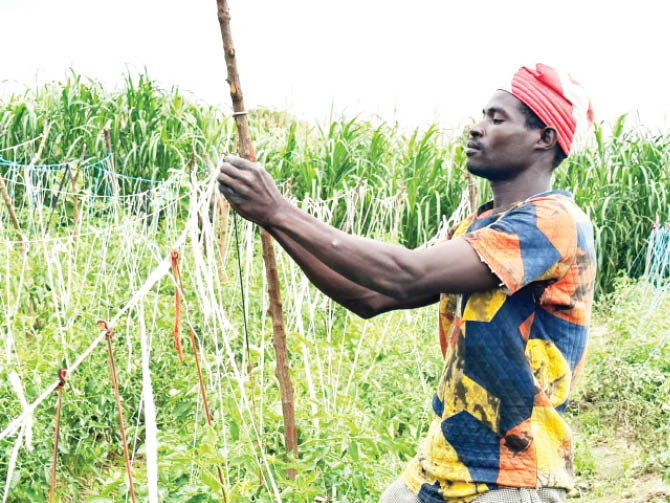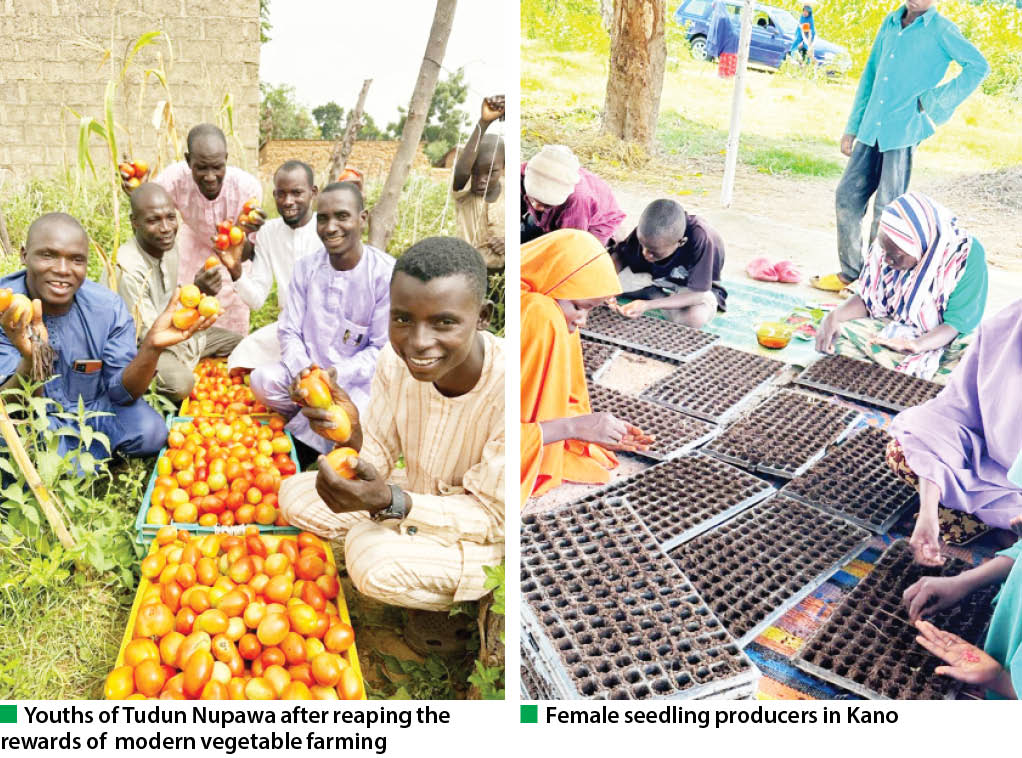The East-West Seed Knowledge Transfer Foundation (EWS-KT) learning site at Sa’adatu Rimi University of Education, Kano, stands as a premier destination for agriculture staff and students, as well as other individuals who are passionate about acquiring expertise in vegetable production.
On a visit to the site, the university’s deputy vice-chancellor, Dr Miswaru Bello told Daily Trust on Sunday that, “Our focus remains on facilitating a comprehensive educational experience wherein the site augments students’ training to complement both theoretical and practical aspects.
“The students are brought here for demonstration to see how things are practically done and for the global best practices in the area of vegetable farming and production.”
EWS-KT trains small-scale farmers in best practices for vegetable production and improves their business skills, with the goal of raising farmers’ incomes, increasing the supply of vegetables and invigorating agricultural input markets.
2250 rural farmers excited as IFAD, FG provide interventions
Cow fattening is good business if you get it right
The EWS-KT learning sites at Sa’adatu Rimi University of Education and Ahmadu Bello University (Kaduna) showcase improved agricultural techniques for multiple vegetable crops and provide practical learning opportunities for visitors like students, staff and agricultural professionals.
On a visit to Tudun Ladi village, Kura Local Government Area, our reporter met with a tomato farmer named Sagir Ado, who was busy tying his tomato stems with a thread to a pole, a technique called trellising that provides support for the tomato plants. He said he adopted this method after witnessing its benefit to fellow farmers engaged in modern practices for higher yields.
“Honestly, we love this practice because we are seeing its enormous benefits. The system was brought to us by one Mallam Yusuf, a staff of East-West Seed Knowledge Transfer Foundation who taught our community how to go about the new farming practices.
“As you can see, almost every household has adopted the system of farming, both the old and young. As I speak, we are reaping the reward of higher income from our bountiful yields. I now own an additional plot of farmland and a motorcycle as benefits from these practices. This is indeed a great development for our community,” Ado said.

Life-transforming story of Bashir Abdu Sani
After touring the extensive learning site at the Sa’adatu Rimi University, our reporter visited several communities to hear directly from the farmers.
Although Bashir Abdu Sani, a resident of Gidan Kwari community in Bunkure, is a seasoned and sophisticated farmer, he couldn’t raise above N20,000 as capital as a sole business farmer.
He could only manage to feed himself and his family with the meager resources at his disposal until EWS-KT’s intervention changed his life for the better.
“I started as a key farmer with EWS-KT in 2020. I invested N12,400 and acquired N300,000 at the end of the trial. The returns induced me to adopt the techniques and upscale my production in the subsequent years.
“It is my fourth year now and my capital alone is currently over N1.5million. People stared at me at the onset, thinking I was mad and made all kinds of derogatory comments.
“They eventually came to see the advantage of these cutting-edge agricultural practices. Now, everyone in our town is happy to adopt the new farming system brought by Knowledge transfer,” he said with a smile.
New opportunities for Bunkure youths
The vibrant youths of Bunkure Local Government Area stand out as an example of beneficiaries of this farming intervention as the rate of unemployment in area has reduced drastically, with almost every youth engaged in positive farming activities.
One of the tales that exudes optimism, self-assurance and growth is that of Aliyu Dahiru Musa, a young man from Daganawa village. “These advanced methods have favourably affected every aspect of my life.
“There wasn’t much to do in this area, so you would hardly ever see me at home. All of us left our rural communities in search of better opportunities in urban areas,” he told Daily Trust on Sunday.
His farming journey began two years ago when he came back from a trip and was offered some Padma F1 tomato seedlings. Wondering how to take care of them, Musa began to participate in trainings held by EWS-KT. To his surprise, the seedlings he planted performed excellently.
“From my first tomato harvest, I made N25,000 as profit, the second harvest profit was N65,000, and by the third harvest, the profit was triple with N150,000. With the profit gained, I bought a motorcycle. If you want lots of money, tomatoes are the top vegetable to invest in,” he said.
Musa continued by saying he does not believe there are unemployed youths at the moment in the village, and that despite the difficulties brought on by the country’s present economic downturn, the locals are unaffected.
“We have established a football club to serve as a source of extracurricular athletic activity, and such avenues are used to educate youths from within and outside our community on the need to embrace modern farming practices,” he added.
In Gidan Kwari community, Abdulhadi Haladu, the son and representative of the village head, expressed deep gratitude for the positive changes brought about by the EWS-KT modern farming system. He emphasized that their community had lacked significant development until the introduction of this new farming approach. This innovative system has not only benefited their community but has also spread to neighbouring communities.
“I have had the joy of harvesting farm produce multiple times. The improved varieties of tomatoes and cucumbers I have cultivated have been yielding great results. It is truly remarkable considering our village’s history of struggling with development.
“Back in the day, many of our youths, including myself, used to venture to far-off southern or eastern parts of the country during the rainy season, hoping to find better opportunities, but now, we don’t have to embark on long journeys. Instead, we have discovered a new way to succeed right here in our local markets. This farming approach has brought transformation among our youths,” Haladu told our reporter.
Advancing economic development for women
As the momentum of agricultural development continues to spread like wildfire, women are not left behind. Their active involvement in producing improved seedling varieties for farmers within and beyond the community is remarkable.
Maimuna Idris said, “My journey commenced with the knowledge imparted to me during training provided by the East-West Seed Knowledge Transfer Foundation.
“Seeing how skilled we were with raising healthy seedlings, Syngenta Foundation for Sustainable Agriculture furnished us with greenhouse infrastructure. And having been equipped with the necessary skills to operationalise it, we began a massive seedling production venture for commercial purposes.
“The overarching goal was to create a ripple effect of self-sustenance for ourselves, our families and the wider community. This initiative has manifested in the establishment of a nursery, where we cultivate and nurture advanced varieties of seedlings for sale to fellow farmers.”
She explained how she and other women trained by EWS-KT began to grow their own seedlings.
The women germinate the seeds in trays, with each tray comprising 128 cells. The seedlings are then cultivated and made available for purchase. Idris explained that a single woman could plant and manage up to seven packs of seedlings each day.
“Collaboratively, we have cultivated a network of around 15 individuals indirectly involved in the greenhouse management, with more than 100 seedling producers reaping its rewards.
“Our customer base extends far and wide, encompassing regions such as Kaduna, Katsina, Daura, Zaria, Keffi, Gombe, Sokoto, Jigawa and various parts of Kano, including Minjibir, and recently, across the borders.
“Many times we find ourselves overwhelmed by customers, prompting us to temporarily disconnect our phones to ensure uninterrupted work,” she explained.
Since 2018, EWS-KT has trained an impressive 141,600 farmers in Kaduna and Kano in partnership with like-minded organisations.
The HortiNigeria project, sponsored by the Embassy of the Kingdom of the Netherlands, is implemented in partnership with IFDC, Wageningen University and Research, and KIT Royal Tropical Institute. The SDGP Transforming Nigeria’s Vegetable Market project, sponsored by the Ministry of Foreign Affairs of the Netherlands (RVO), is implemented in partnership with East-West Seed, Ministry of Agriculture and Forestry, Kaduna State, Ahmadu Bello University, Wageningen University and Research, and Solidaridad Network West Africa.

 Join Daily Trust WhatsApp Community For Quick Access To News and Happenings Around You.
Join Daily Trust WhatsApp Community For Quick Access To News and Happenings Around You.


